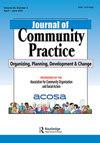从实践到研究再到实践:利用互惠伙伴关系在不同背景和生态水平上推进教育中的种族正义
IF 1.2
Q2 SOCIAL WORK
引用次数: 0
摘要
非裔美国人家庭在受教育方面面临着明显的种族障碍。具体而言,在学校教育中,反黑人压迫力量以结构性和人际关系两种形式表现出来,COVID-19大流行加剧了现有挑战。黑人家庭一直在制定应对种族化教育障碍的策略。此外,通过参与以正义为导向的社区伙伴关系,他们自己的机构也得到了加强。目前的研究抓住了互惠的大学-社区伙伴关系如何在大流行之前和期间推动非裔美国人的父母机构。首先详细介绍了伙伴关系的历史,然后对来自六个家长焦点小组的数据进行定性研究,这些数据涉及家长对公立和私立学校环境中教育成功障碍的看法,他们自己克服这些障碍的努力,以及社区大学伙伴关系在促进家庭教育目标方面的作用。研究结果显示,在公立和私立学校环境中存在生态上明显的种族化障碍,经济障碍超越了教育背景。黑人父母通过跨父母参与领域的适应性策略来克服这些障碍。讨论了对研究、实践和大学与社区伙伴关系的影响。关键词:社区参与;非裔美国人;种族平等;非裔美国人和黑人这两个术语在本书中交替使用。第五个创始项目“匹兹堡更高成就”(Higher Achievement Pittsburgh)是一个全国性组织的地方分会,后来因经济挑战于2019年关闭。匹兹堡高等成就中心每年为100多名公立中学学生提供学术丰富、指导和教育咨询。在整个手稿中,父母和照顾者这两个术语互换使用,以承认这样一个事实,即父母的行为——对年轻人的主要照顾之一——是通过许多家庭和亲属角色(祖父母、哥哥姐姐等)来完成的。这两者在这里都被用来包括对年轻人的主要照顾责任,而不管提供者的确切关系地位。本研究的资金由亨氏基金会提供(赠款E9539)。所有研究参与者及其对应的学校和社区名称均为假名。本研究由亨氏基金会(由十字路口基金会管理)资助[E9539]。本文章由计算机程序翻译,如有差异,请以英文原文为准。
From Practice-to-Research-to-Practice: Leveraging Reciprocal Partnerships to Advance Racial Justice in Education Across Contexts and Ecological Levels
ABSTRACTAfrican American families face significant racial barriers to their educational attainment. Within the experience of schooling specifically, anti-Black oppressive forces manifest in both structural and interpersonal forms, and existing challenges have been exacerbated by the COVID-19 pandemic. Black families have consistently developed strategies for navigating racialized educational barriers. Moreover, their own agency has been enhanced through engagement with justice-oriented community partnerships. The current study captures how a reciprocal university-community partnership advanced African American parent agency before and during the pandemic. The history of the partnership is first detailed, followed by a qualitative study of data from six parent focus groups regarding parents’ perceptions of barriers to educational success across public and private school contexts, their own efforts to overcome those barriers, and the role of the community university partnership in advancing the families’ educational aims. Findings reveal ecologically distinct racialized barriers in public and private school settings, with economic barriers transcending educational contexts. Black parents navigated these barriers with adaptative strategies across parent involvement domains. Implications for research, practice, and university-community partnerships are discussed.KEYWORDS: Community engagementafrican Americanseducationracial equityparentingqualitative research Disclosure statementNo potential conflict of interest was reported by the author(s).Notes1. The terms African American and Black are used interchangeably throughout this text.2. A fifth founding program, Higher Achievement Pittsburgh, was a local chapter of a national organization before closing its doors in 2019 due to economic challenges. Higher Achievement Pittsburgh provided academic enrichment, mentoring, and educational counseling to more than 100 public middle school students annually.3. The terms parents and caregivers are used interchangeably throughout the manuscript to acknowledge the fact that the act of parenting – one of primary caregiving for a youth – is carried out by way of many familial and kinship roles (grandparents, older siblings, etc.). Both are used here as inclusive of having primary caregiving responsibilities for youth regardless of the precise relational positionality of the provider.4. Funding for this study was provided by grants from The Heinz Endowments (grant E9539).5. All study participant and corresponding school and neighborhood names are pseudonyms.Additional informationFundingThe work was supported by the The Heinz Endowments (as administered by the Crossroads Foundation) [E9539].
求助全文
通过发布文献求助,成功后即可免费获取论文全文。
去求助
来源期刊

Journal of Community Practice
SOCIAL WORK-
CiteScore
2.40
自引率
18.20%
发文量
27
期刊介绍:
The Journal of Community Practice is an interdisciplinary journal grounded in social work. It is designed to provide a forum for community practice, including community organizing, planning, social administration, organizational development, community development, and social change. The journal contributes to the advancement of knowledge related to numerous disciplines, including social work and the social sciences, urban planning, social and economic development, community organizing, policy analysis, urban and rural sociology, community health, public administration, and nonprofit management. As a forum for authors and a resource for readers, this journal makes an invaluable contribution to the community"s conceptualization, applications, and practice.
 求助内容:
求助内容: 应助结果提醒方式:
应助结果提醒方式:


